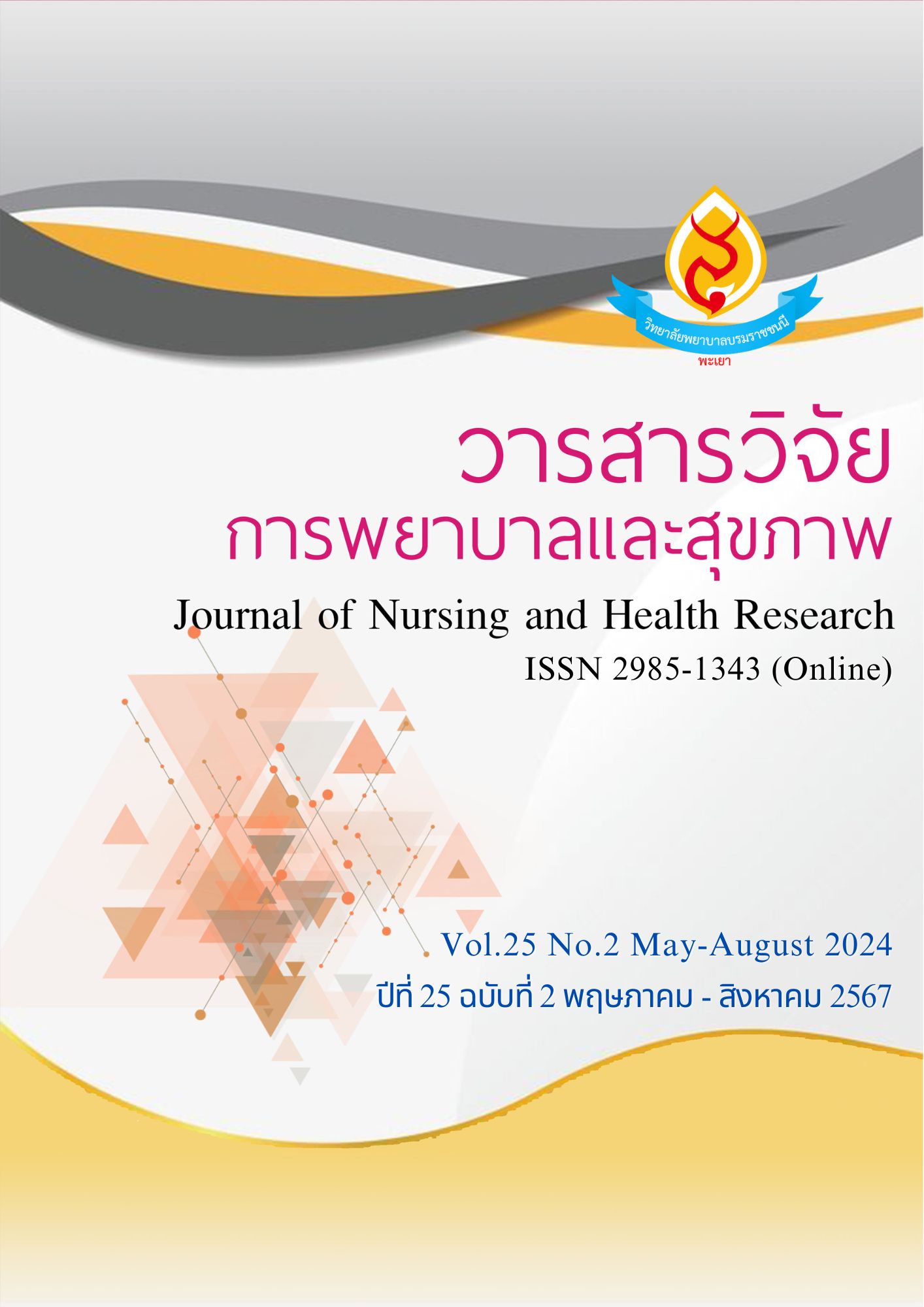ผลของการอบรมซ้ำร่วมกับการเยี่ยมบ้านต่อความรู้และทักษะปฏิบัติของผู้ป่วยล้างไตทางช่องท้องที่มีภาวะเยื่อบุช่องท้องอักเสบ
คำสำคัญ:
การอบรมซ้ำ, ความรู้, ทักษะปฏิบัติ, การล้างไตทางช่องท้อง, เยื่อบุช่องท้องอักเสบบทคัดย่อ
เยื่อบุช่องท้องอักเสบเป็นภาวะแทรกซ้อนที่สำคัญพบได้บ่อยในผู้ป่วยล้างไตทางช่องท้อง การอบรมซ้ำในด้านความรู้และทักษะปฏิบัติในการล้างไตทางช่องท้องรวมถึงได้รับการติดตามดูแลอย่างต่อเนื่องที่บ้านจะช่วยลดและป้องกันภาวะแทรกซ้อนดังกล่าวได้ การวิจัยนี้มีวัตถุประสงค์เพื่อเปรียบเทียบความรู้และทักษะปฏิบัติก่อนและหลังการอบรมซ้ำ ในผู้ป่วยล้างไตทางช่องท้องที่มีภาวะเยื่อบุช่องท้องอักเสบ การศึกษาครั้งนี้เป็นการวิจัยกึ่งทดลองชนิดกลุ่มเดียวเปรียบเทียบก่อนและหลังการทดลอง เลือกกลุ่มตัวอย่างแบบเจาะจง จากผู้ป่วยล้างไตทางช่องท้องที่มีภาวะเยื่อบุช่องท้องอักเสบที่มารับบริการที่โรงพยาบาลเชียงคำ จำนวน 34 ราย ประเมินความรู้และทักษะปฏิบัติก่อนและหลังการอบรมซ้ำที่โรงพยาบาลเชียงคำ และติดตามดูแลอย่างต่อเนื่องที่บ้าน เครื่องมือที่ใช้เก็บรวบรวมข้อมูล คือแบบประเมินความรู้ และแบบประเมินทักษะปฏิบัติในการล้างไตทางช่องท้อง วิเคราะห์ข้อมูลด้วยสถิติเชิงพรรณนา และเปรียบเทียบผลก่อนและหลังการอบรมซ้ำ โดยใช้สถิติทดสอบวิลคอกซัน ผลการศึกษา พบว่า หลังการทดลองคะแนนความรู้และทักษะปฏิบัติในการล้างไตทางช่องท้องสูงกว่าก่อนการทดลองอย่างมีนัยสำคัญทางสถิติ (p<.01) การอบรมซ้ำและการเยี่ยมบ้านเพื่อการดูแลต่อเนื่องที่บ้าน เป็นวิธีการที่ช่วยให้ผู้ป่วยล้างไตทางช่องท้องมีความรู้ ทักษะปฏิบัติ ในการล้างไตทางช่องท้องเพิ่มมากขึ้น และสามารถปฏิบัติในการดูแลตนเองต่อเนื่องที่บ้านได้อย่างถูกต้อง จึงควรส่งเสริมติดตาม ประเมินผลอย่างต่อเนื่อง และประยุกต์ใช้เป็นรูปแบบการอบรมผู้ป่วยล้างไตทางช่องท้องในผู้ป่วยรายใหม่ต่อไป
เอกสารอ้างอิง
Cheetham, M. S., Zhao, J., McCullough, K., Fuller, D. S., Cho, Y., Krishnasamy, R., Boudville, N., Figueiredo, A. E., Ito, Y., Kanjanabuch, T., Perl, J., Piraino, B. M., Pisoni, R. L., Szeto, C. C., Teitelbaum, I., Woodrow, G., & Johnson, D. W. (2022). International peritoneal dialysis training practices and the risk of peritonitis. Nephrology Dialysis Transplantation, 37(5), 937–949. https://doi.org/10.1093/ndt/gfab298
Chuasuwan, A., & Lumpaopong, A. (Eds.). (2021). Thailand renal replacement therapy report 2020. Thai Society of Nephrology. (in Thai). https://www.nephrothai.org/wp-content/uploads/2022/06/Final-TRT-report-2020.pdf
Gursu, M., Shehaj, L., Elcioglu, O. C., & Kazancioglu, R. (2023). The optimization of peritoneal dialysis training in long-term. Frontiers in Nephrology, 3, Article 1108030. https://doi.org/10.3389/fneph.2023.1108030
Jaelani, T. R., Ibrahim, K., Jonny, J., Pratiwi, S. H., Haroen, H., Nursiswati, N., & Ramadhani, B. P. (2023). Peritoneal Dialysis Patient Training Program to Enhance Independence and Prevent Complications: A Scoping Review. International Journal of Nephrology and Renovascular Disease, 16, 207–222. https://doi.org/10.2147/IJNRD.S414447
Jirawatkul, A. (2015). Statistics for health science research. Witthayaphat
Kanjanabuch, T. (Ed.). (2018). Clinical practice guideline (CPG) for peritoneal dialysis 2017. Bangkok: Kidney Association of Thailand. (In Thai)
Kotchaseni, P. (2020). Current renal replacement therapy. Bhumibol Adulyadej Hospital. https://www.nephrothai. org/wp- content/uploads/2020/08. (In Thai)
Li, P. K.-T., Chow, K. M., Cho, Y., Fan, S., Figueiredo, A. E., Harris, T., Kanjanabuch, T., Kim, Y.-L., Madero, M., Malyszko, J., Mehrotra, R., Okpechi, I. G., Perl, J., Piraino, B., Runnegar, N., Teitelbaum, I., Wong, J. K.-W., Yu, X., & Johnson, D. W. (2022). ISPD peritonitis guideline recommendations: 2022 update on prevention and treatment. Peritoneal Dialysis International, 42(2), 110–153. https://doi.org/10.1177/08968608221080586
López, A. S., Fano, B. L., Flórez, A. A., & Velasco, M. P. (2021). El reentrenamiento programado reduce la tasa de peritonitis en diálisis peritoneal. Nefrologia, 42(2), 219-220. https://doi.org/10.1016/j.nefro.2020.09.009
Medical record division. (2023). Summary of peritoneal dialysis patient information for 2009 –2023. Chiangkham Hospital. (in Thai)
Ministry of Public Health. (2023, August 1). Number of patients with chronic kidney disease in Health region 1. Health Data Center. https://hdcservice.moph.go.th/hdc/reports/report.php?&cat_id=e71a73a77b1474e63b71bccf727009ce&id=5d523ced4c9569123109fa6f4071d35f
Santlou, N., Sartphet, W., & Naphaarrak, Y. (2019). Sample size calculation using G*Power Program. Journal of Suvarnabhumi Institute of Technology, 5(1), 496-507. https://so04.tci-thaijo.org/index.php/svittj/article/view/181958/136948 (in Thai)
Special nursing division. (2023). Summary of peritoneal dialysis patient information for 2021 -2023. Nursing department. Chiangkham Hospital. (in Thai)
Xu, Y., Zhang, Y., Yang, B., Luo, S., Yang, Z., Johnson, D. W., & Dong, J. (2019). Prevention of peritoneal dialysis-related peritonitis by regular patient retraining via technique inspection or oral education: a randomized controlled trial. Nephrology Dialysis Transplantation, 35(4), 676–686. https://doi.org/10.1093/ndt/gfz238
ดาวน์โหลด
เผยแพร่แล้ว
รูปแบบการอ้างอิง
ฉบับ
ประเภทบทความ
สัญญาอนุญาต
ลิขสิทธิ์ (c) 2024 วารสารวิจัยการพยาบาลและสุขภาพ

อนุญาตภายใต้เงื่อนไข Creative Commons Attribution-NonCommercial-NoDerivatives 4.0 International License.



